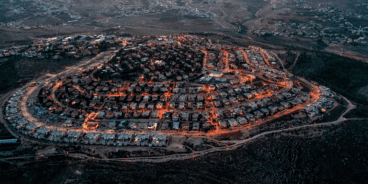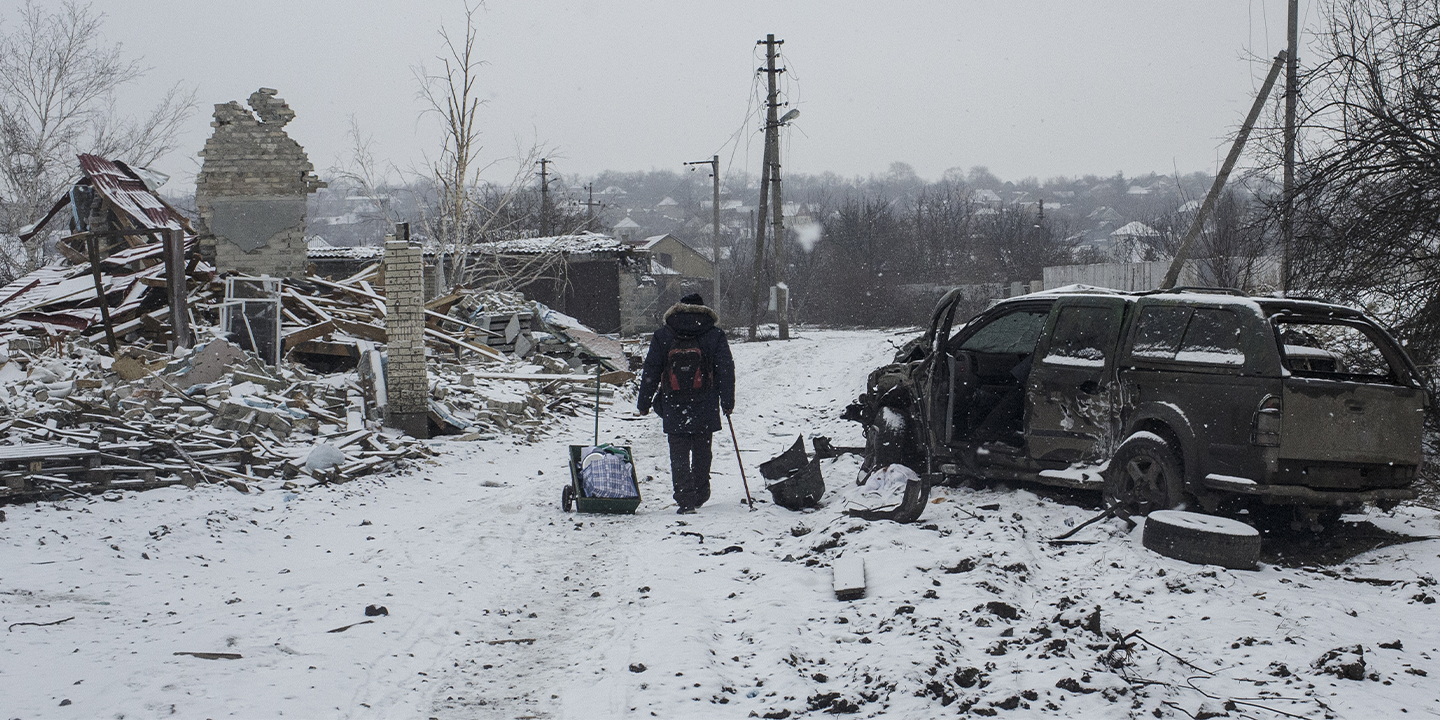

Atrocity Alert No. 333: Ukraine, Ethiopia and Israel and the Occupied Palestinian Territory
Atrocity Alert is a weekly publication by the Global Centre for the Responsibility to Protect highlighting situations where populations are at risk of, or are enduring, mass atrocity crimes.
CASUALTIES CLIMB IN UKRAINE AS RUSSIA CONTINUES TO TARGET CIVILIAN AREAS
On 26 January Russian forces sent a wave of missile and drone strikes across 11 different regions of Ukraine, killing at least 12 civilians. The strikes are among a series of incidents throughout the conflict featuring the use of indiscriminate weapons in civilian populated areas, which is illegal under International Humanitarian Law and may amount to a war crime. Nearly two weeks earlier, on 14 January, a Russian missile struck an apartment building in Dnipro, destroying at least 30 apartments, killing 46 civilians, including six children, and injuring 80 others in the single deadliest attack on Ukrainian civilians in recent months. Ukrainian authorities said an anti-ship missile – which are known for their inaccuracy – was used during the attack.
Fighting also continues in the eastern regions of Donetsk and Luhansk, an area collectively known as Donbas, where Russia has been vying for control since 2014. On 28 January dozens of civilians were reportedly killed or injured in a strike on a hospital in Novoaidar in the Russian-controlled area of the Luhansk region, according to the UN Office for the Coordination of Humanitarian Affairs. The following day strikes in Ukrainian-controlled Kherson city killed civilians, as well as damaged a hospital, homes and a school.
Since Russia invaded Ukraine nearly a year ago, more than 7,110 civilian deaths, including over 438 children, have been verified by the UN. The actual figure is likely considerably higher. The crisis has displaced over 14 million people, including more than 7.6 million who have fled to neighboring countries. Following his recent visit to Ukraine, the UN High Commissioner for Refugees, Filippo Grandi, said he was “appalled by the level of destruction… as a result of Russian missiles and shelling. Civilians, including children and the elderly, have been killed or fled their homes, having their entire lives uprooted by these senseless attacks.” High Commissioner Grandi also expressed concern regarding Russia’s violation of child protection principles, as authorities have issued Russian passports to unaccompanied child refugees and have put them up for adoption with Russian families.
Despite multiple attempts by the UN and others to mediate an end to the conflict, peace remains elusive. On 18 January UN Secretary-General António Guterres warned, “there will be an end…there is an end of everything, but I do not see an end of the war [in Ukraine] in the immediate future.” As the war progresses, the international community should continue to provide support to Ukraine, as well as take steps to encourage Russian support for peace talks through the strategic use of sanctions. The international community should also continue to provide assistance to the millions displaced and in need across the country.
DESPITE PEACE DEAL, MULTIPLE CHALLENGES PLAGUE ETHIOPIA
After two years of conflict in northern Ethiopia between the federal government and its allies and forces loyal to the Tigray People’s Liberation Front, parties to the conflict signed a peace deal in November 2022. The agreement triggered a significant decrease in fighting and allowed increased aid delivery to Tigray. On 11 January, in keeping with the terms of the agreement, the first heavy weapons transfers from the Tigray Defense Forces to the federal government began.
While negotiations on the specifics of the peace deal continue, outstanding issues remain, including addressing ongoing accessibility challenges for humanitarian actors and the complete withdrawal of Eritrean Defense Forces who fought alongside the federal government but were not party to the peace agreement. Despite the Ethiopian government’s claims that all Eritrean forces have departed Tigray, many aid groups and residents have reported that Eritrean soldiers remain in several areas and allegations of abuses have continued. Eritrean forces have been accused of committing war crimes and crimes against humanity against Tigrayan civilians throughout the conflict.
Accountability for alleged war crimes, crimes against humanity and ethnic cleansing committed throughout the conflict also remains a challenge. On 26 January the UN Human Rights Council-mandated International Commission of Human Rights Experts on Ethiopia released a statement acknowledging the federal government’s draft “Policy Options for Transitional Justice,” which provides recommendations on possible remedies for successive failures of justice in Ethiopia. The Commission stated they would welcome the opportunity to discuss key issues in order to “strengthen inclusive, gender-responsive, victim and survivor-centered approaches to accountability, truth-telling and reconciliation, reparations, and the necessary policies for non-recurrence of violations.”
While progress has been made in Tigray, risks to civilians have escalated in other areas of the country due to recurrent cycles of inter-communal violence. Fighting in and around the town of Jewuha, Amhara region, reportedly broke out on 22 January between members of the Amhara regional special forces and the Oromo Liberation Army, an ethnic Oromo armed group. The initial fighting killed dozens of militants and civilians. Fighting subsequently spread to neighboring towns, causing thousands of people to flee and killing dozens more.
The Global Centre for the Responsibility to Protect’s Ethiopia expert, Sarah Hunter, said, “The international community must continue to call for the full implementation of the peace agreement in Tigray and for progress towards resolving all outstanding issues that could jeopardize the process. The Ethiopian government must seize this opportunity to holistically address long-standing grievances, as well as advance accountability for victims of this devastating conflict.”
POPULATIONS IN OCCUPIED WEST BANK AT RISK OF ATROCITIES AS DEADLY ATTACKS ESCALATE
On Thursday, 26 January, Israeli security forces carried out the deadliest single raid in the Occupied West Bank in decades, killing at least nine Palestinians, including an elderly woman, and injuring 20 more during an operation at the Jenin refugee camp. The deadly raid prompted a Palestinian gunman to open fire outside a synagogue, killing seven and injuring three Israelis in the occupied East Jerusalem neighborhood of Neve Yaakov. Following this incident – the deadliest against Israelis in 15 years – Israel launched multiple air attacks on the blockaded Gaza Strip. The Israeli army alleges that two rockets were fired towards Israel by the Palestinian Islamic Jihad. Violent incidents have been ongoing in subsequent days and Israeli Prime Minister Benjamin Netanyahu has promised a series of punitive steps against Palestinians, including steps to “strengthen settlements” and sanctions against families of alleged Palestinian attackers.
The UN Special Rapporteurs on the situation of human rights in the Palestinian Territory, on extrajudicial, summary or arbitrary executions, and on counterterrorism and human rights, condemned the renewed violence and Israeli killings of Palestinians. In a statement, the experts stressed, “None of this violence would occur if Israel were to end its illegal, half-century old occupation immediately and unconditionally as required by international law… We recall once again that Israel, as long as it remains the occupying Power, has an obligation to ensure the protection, security and welfare of the Palestinian people living under its occupation.” The experts also reiterated that these latest developments are part of the collective punishment of the Palestinian people, including in Jenin.
Violent crackdowns on Palestinians have been on the rise since Israel’s launch of “Operation Breakwater” in spring 2022, which claims to target Palestinian armed groups in Jenin and Nablus. The Jenin refugee camp is notably the location where Palestinian journalist Shireen Abu Akleh was shot dead in May 2022. According to the UN Office for the Coordination of Humanitarian Affairs, 2022 was the deadliest year for Palestinians residing in the Occupied West Bank, including East Jerusalem, since 2006, with over 156 Palestinians, including 26 children, killed by Israeli security forces. These often follow attacks or incursions by Israeli settlers into Palestinian villages and include search-and-arrest operations and violent confrontations with Palestinians. Israeli forces have killed at least 29 Palestinians, including five children, in similar raids so far in 2023.
Both Palestinians and Israelis continue to pay with their lives as deadly attacks escalate amidst an institutionalized regime of systematic racial oppression targeting Palestinians. The international community should work to end the near-total impunity enjoyed by Israel for the crime of apartheid against Palestinians.
Related Content


Atrocity Alert No. 403: Israel and the Occupied Palestinian Territory, Sudan and the UN Human Rights Council
